An interesting lesson learned last week: In-email polls are kind of messy.
While it was convenient to have the poll right in your email, it turns out, you have to not just click the poll but then go to the page it loads and confirm + submit your choice there.
Because of that, we saw only about 30% of people who clicked a poll option actually submit their answer.
That's a lower completion rate than we see for our longer polls in Google Forms, so we will stick to those in the future, unless Convertkit (our email provider) improves this feature to address that.
Regardless, I want to thank everyone for taking that poll and helping break the tie.
Our next Lighthouse Lessons program will now by "Mastering Meetings:
Thanks to everyone's feedback we also have a great plan for 12 great lessons to help you and your team reclaim your time (more on this later), improve communication, and get back to enjoying the work you do.
In today’s edition, we cover an important lesson in managing your schedule, a BIG breakdown of Gallup's new State of the Global Workplace 2024, a new post on Servant Leadership concepts, and more details about our new program.
Let’s dive in…
Table of contents:
- 🥘 Food for Thought on Building Your Work Container
- 📰 News & Reports for Managers on Gallup's Big New Report
- 🗓️ Coming Soon: The newest Lighthouse Lessons program
➡️ Did a friend forward this to you? Get every issue straight to your inbox by signing up here.
Note: This is a preview of our weekly leadership newsletter, Lighthouse Leadership Weekly (LLW).
To get this sent to your inbox every week, along with our latest long form essays on this blog, you can sign up here.
🥘 Food for Thought
"You must create a non-negotiable container of time that creates a personal life for you - a "work container." - Gino Wickman in the EOS Life
I recently read the EOS Life and was pleasantly surprised at the insights. I almost didn't read it (it was a gift from someone) because I thought it was just a consultancy sales book.
Instead, I was pleasantly surprised that it was short, to the point, and had a few real gems.
(If you run a business, you might enjoy it, too, but there's less value in it for your average manager, which is why it doesn't qualify for our "Book of the Month" list.)
One of the best lessons in the book is around managing your time, so that you can have the professional *and* personal lives you really want.
What is Your "Work Container"?
The work container is the total amount of time you want to be available for work in a given week and a given year.
The author had a limit of 55 hours a week, and 40 weeks a year (Note: he takes a lot of vacation time at this point, because his wealth allows it).
The point of deciding on your container is to force you to make decisions.
Rather than letting work consume however much time you have available at a given time (and blow past that in a crisis), the point is to create firm boundaries.
When something comes up that pushes against your max amount of time for work, you then make a decision: What will you delegate?
This is a great forcing function, that then sets up an important, second part of building the life you want:
Delegate & Elevate
One of the core principles of the EOS Life is that you set yourself up to do more of the work you love and are great at, and delegate the rest.
They have a great table that makes this easy and obvious:
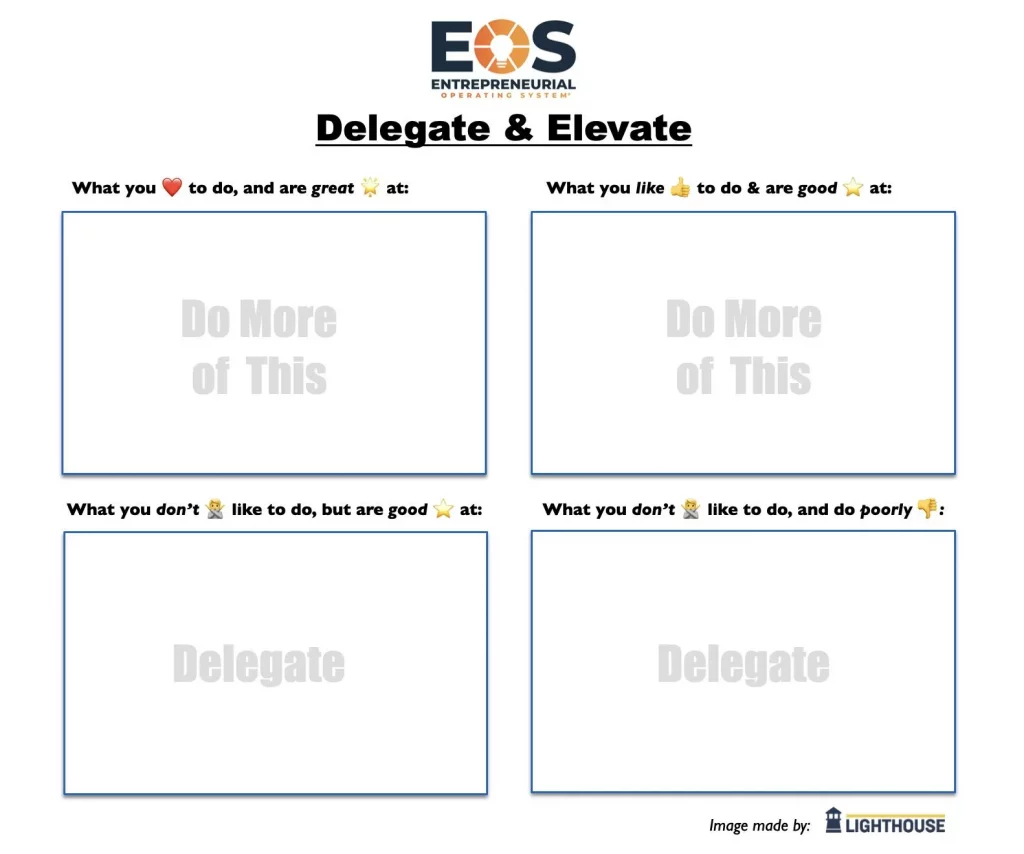
Put simply, you should delegate all the things in the bottom two boxes, and spend more time doing the top 2 quadrants. The absolute ideal is then getting as much as you can to the top left "What you love to do, and are great at."
When you combine these 4 quadrants with your work container, it helps you understand specifically what you should and shouldn't do as you approach your limit:
- First, delegate things you don't like and are not good at.
- Then, delegate things you don't like and are good at.
By using this lens to decide how to manage your time, you get to lean into your strengths while doing more of what you enjoy. And all of this happens while keeping your work schedule (ideally) under control.
A real example:
In honor of Father's Day last week, my father was a great example of this.
His work container was usually 50-60 hours a week of work with a summer vacation and a bit of extra time off around the holidays.
Yet, the most important boundary he set was in the evenings:
- He never missed family dinner for work unless it was literally for a convention, banquet, or very rare business dinner.
- He never missed one of my sports games, often also volunteering to help out as a coach.
In exchange for that, sometimes to make things work he would:
- Go into work on a Sunday to get ahead of big projects.
- Go in extra early in the morning (sometimes before 7:00am) to get caught up before his staff arrived (between 8:00 and 9:00am).
He also did his best to delegate projects. As he told me once, "I'm great at starting new initiatives, but once they're going, other people are better at maintaining and growing them."
That meant he would often hand off projects after a big launch, or hitting certain milestones. He would then head straight to the next new project.
To make this work, he made sure to hire some people who liked running with things once he got them started, so that they were excited to take on the work my father didn't want to do.
This process worked extremely well for his team as they 6X'd revenue during his tenure running the business.
Now, it's your turn...
A few important questions for you to ask yourself:
- What is your work container, both in hours you want to work each week, and time off each year?
- How much are you currently blowing past your work container?
- What are your Elevate & Delegate tasks?
- How can you delegate some of the things you don't like to do, so you're back within your work container?
- Who do you need to talk with about 1-4? (Your manager? Team members you'd delegate to? Your family?)
Take a few minutes this weekend, or a quiet moment next week and really think about those. The changes you make could be life changing for you, your work, and your family.
It really can be win-win-win, if you bring your best at work, delegate to those better suited for the tasks, and protect your personal time.
📰 News & Reports for Managers
📌 The most important takeaways from Gallup's new State of the Global Workplace
Gallup has a new major report called the State of the Global Workplace. As usual, I want to share some of the best takeaways that matter most to you:
1) Stress and bad managers go hand in hand
This may not entirely be surprising, but it's always great to see data back up what many of us believe is true.
From the CEO:
"In this year’s State of the Global Workplace report, 41% of employees report experiencing “a lot of stress.”
Yet stress varies significantly depending on how organizations are run.
Those who work in companies with bad management practices (actively disengaged) are nearly 60% more likely to be stressed than people working in environments with good management practices (engaged). In fact, experiencing “a lot of stress” is reported approximately 30% more frequently by employees working under bad management than by the unemployed.
More likely to be stressed, and experiencing it much more frequently is a frustrating 1-2 punch to face with a bad manager.
Anyone who has had such a leader knows this makes complete sense; bad managers can dump extra work on you, yell at or berate you, and do any number of things to add unhealthy stress to your life.
This doesn't mean there's never stress at work with a good manager (sorry, that's part of life), but it does mean you don't deal with extra, unnecessary stress.
2) Loneliness is a new problem Gallup is studying
With the rise of remote and hybrid teams, it's not all that surprising that loneliness is a growing problem. Yet, what is interesting is this insight:
"Work itself decreases loneliness. In general, working adults are less lonely (20%) than those who are unemployed (32%), and this remains true across age groups.
Work interactions do not necessarily need to be in person to provide a benefit. A Gallup study found that all forms of social time (phone, video, texting, etc.) are associated with a better mood."
So for all you hybrid and remote managers, keep in mind that even small things (a quick call, video conference, or chat) can make a difference in the mood and feeling of connection for team members not in the office with you.
But that's not the only loneliness insight. This chart also showed some interesting contrasts:
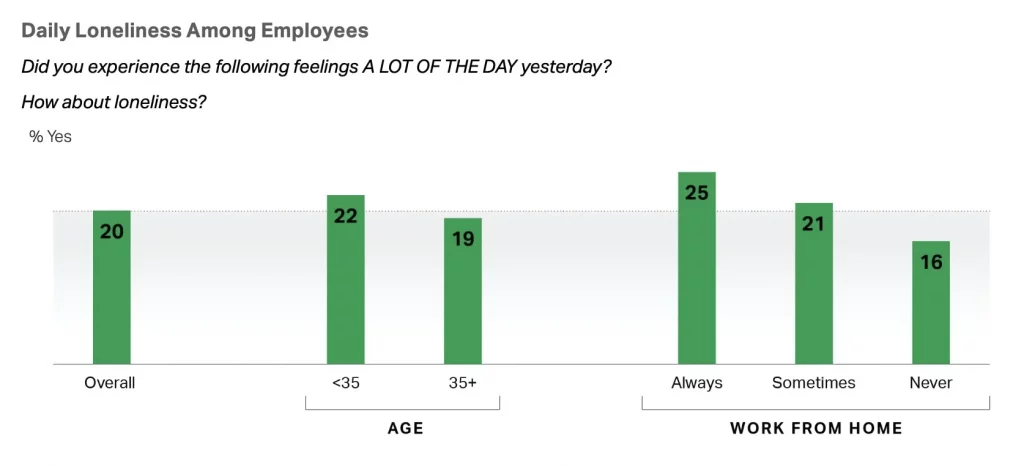
Younger employees are slightly more lonely than older ones, which makes sense since older employees likely have families to keep them company, even if they work remotely.
Meanwhile, it's also not too surprising to see those working from home the most are most likely to be lonely, while those who come into the office consistently are least likely to be lonely. This certainly gives credence to the value of having even your remote team members come into the office sometimes.
3) A variety of emotions play into employee disengagement
This is the first time I've seen Gallup really break up what kinds of emotions go into engagement or disengagement:
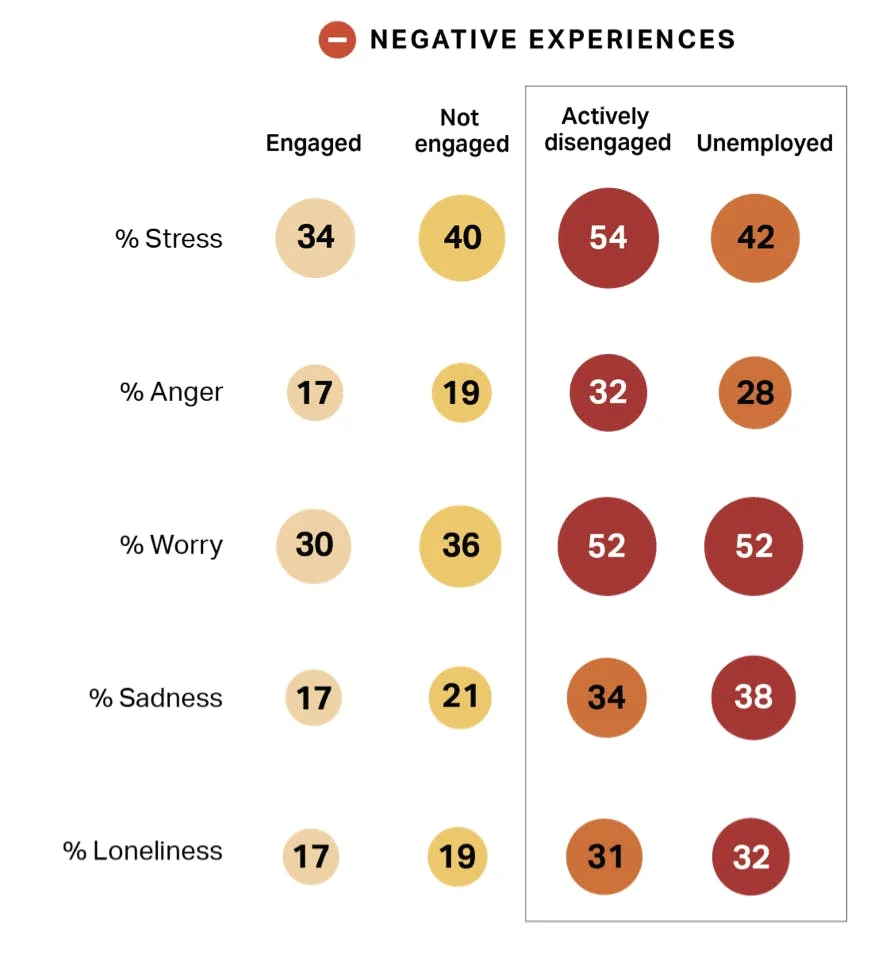
As you can see, if you're actively disengaged, the most common and prevalent feelings are those of stress and worry. This makes sense, because you're likely stressed about the work, worry about your future, and can have a wide mix of emotions caused by your boss.
Remember: Gallup says that 70% of the variance of employee engagement comes from your manager, so whether it's more anger, sadness, loneliness or any of the other listed negative emotions, it makes sense that disengaged employees feel them most.
More specifically, it's easy to imagine how each emotion could be triggered by a bad boss:
- Stress: Bad bosses can create stress through many of their actions and inaction: yelling at and abusing team members, overloading you with work, blaming you for their own failings, not accommodating team member needs, etc.
- Anger: If things aren't going well at work, and your boss keeps not listening to you, you'll have lots of reasons to be angry.
- Worry: When you don't like your boss, you'll likely be worried about your future, whether worried they will fire you, or how much longer you can stomach the job.
- Sadness: When you don't enjoy your work, you're going to be sad a lot in addition to anger and worry.
- Loneliness: Having a manager who doesn't have 1 on 1s with you and doesn't check in much will make it much more likely you feel lonely.
However, it's important to note that even engaged employees experience these emotions. As managers, we can't put our employees in bubble wrap and keep them from ever having a bad day or a rough project. It can still happen.
Our jobs as leaders is instead to avoid contributing to any of those negative emotions unnecessarily and help set up our team members to thrive.
And you can see that it's exactly these positive emotions that engaged employees are much more likely to feel than their disengaged peers:
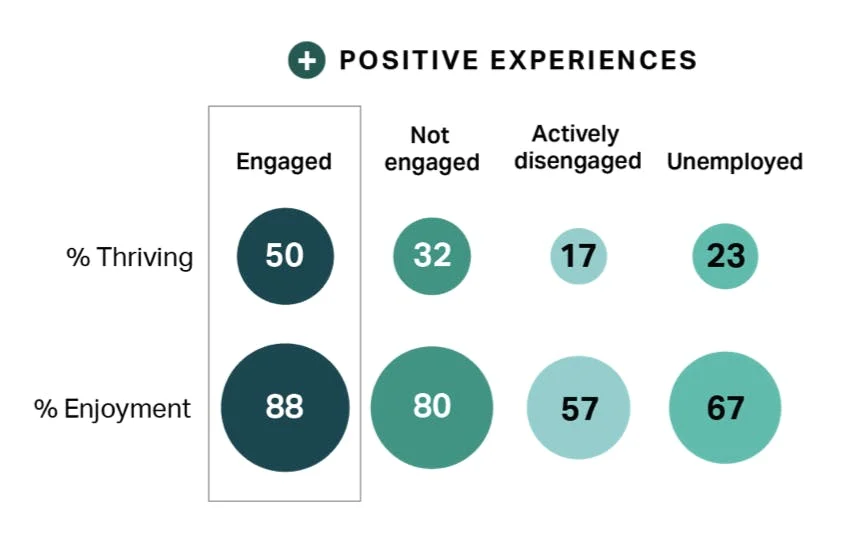
Put together, not only do engaged employees feel less of the big 5 negative emotions, they also have more positive emotions.
4) Management is a double edged sword.
Gallup charted their report data across another interesting vector, comparing managers and non-managers:
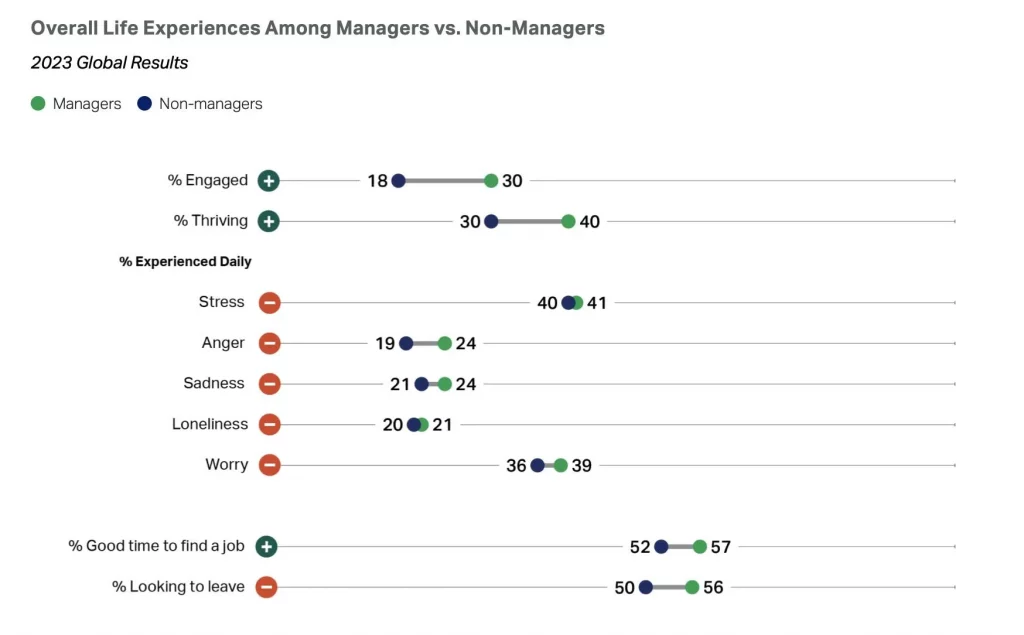
While managers are much more likely to be engaged and thriving, you can also see more managers are looking to leave their job, and noticeably more likely to be angry.
As Gallup puts it:
"Managers are more likely to experience higher pay and higher social status compared to their non-manager peers. They are also more likely to feel their opinions count, to feel connected to their organization and to have manager peers they can rely on for support.
All these likely contribute to higher engagement and life evaluations for managers."
It's pretty good to be a manager!
And this holds true across countries as managers tend to be more engaged than their employees in the vast majority of companies as the trend line shows:
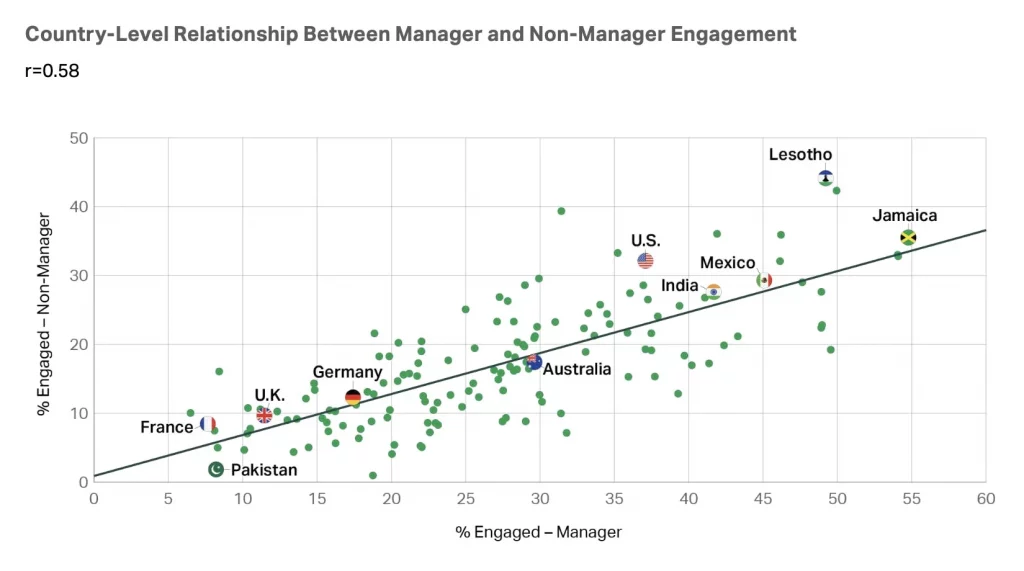
5) The best companies in the world are WAY above average
You've probably seen the charts we've shared in the past that show that total employee engagement seems to be stuck between 30-35% every year.
Yet, that's the *average*.
It turns out, if you segment out the best run companies with cultures of good managers, their engagement is *much* higher:
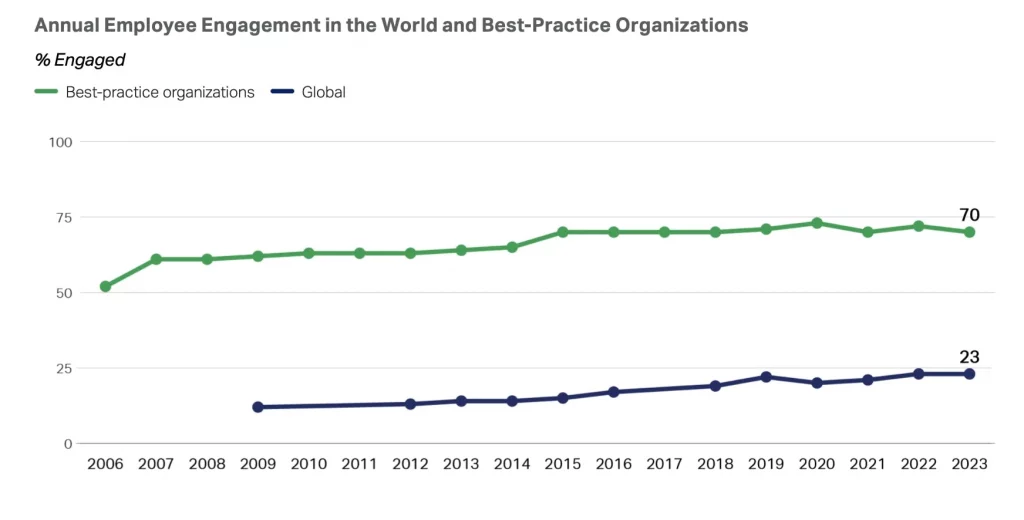
Rather than looking and saying "Well, the average is about 30-35% engaged, so if I'm like that I'm good" you should aim higher.
As you can see, the top organizations have 70% of their employees engaged. When you aim for that, it changes your goals significantly. Now you need 4 out of 6 team members engaged (or 7 in 10 for a larger team).
And as a reminder, it's worth the effort given the benefits of having a highly engaged team:
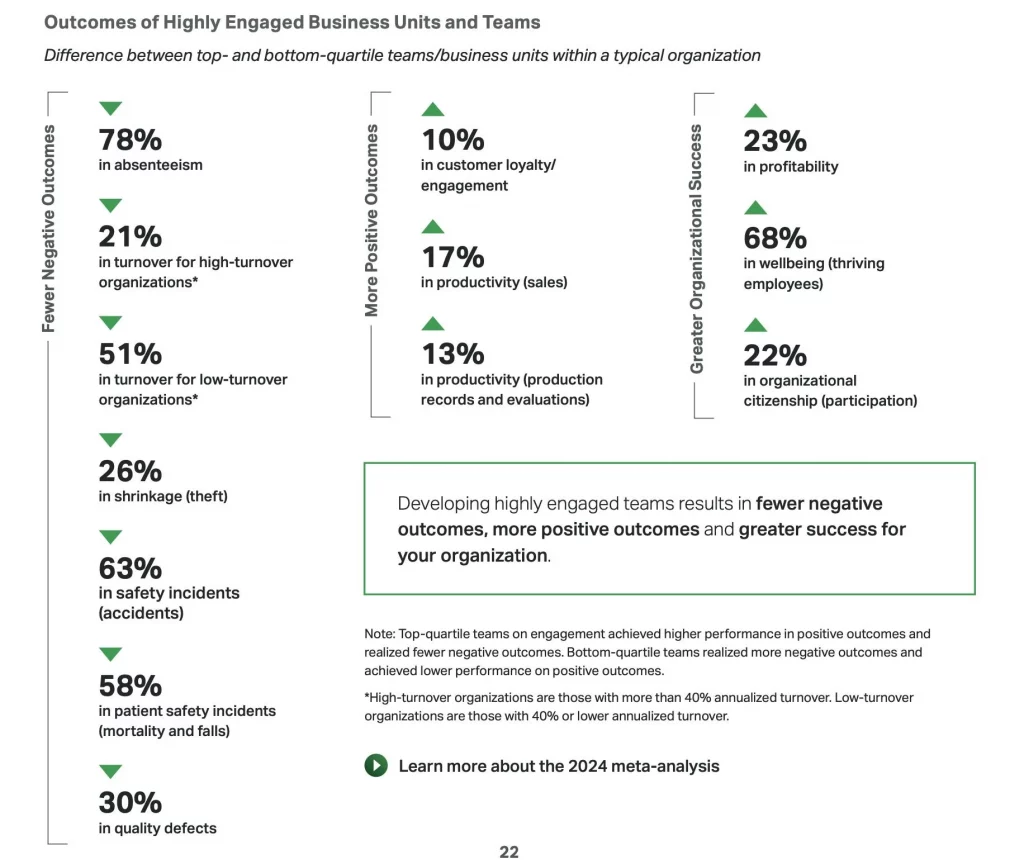
So when we go over these kinds of reports from Gallup, remember that following the kinds of things they recommend does have an impact on your bottom line.
And all those efforts you make to be a good manager and take care of your team can make a difference.
---
Want to learn more? You can see the full 26 page report here.
🗓️ Have You Mastered Your Meeting Schedule?
One of the fun things about developing new Lighthouse programs is how we're able to involve you in the process.
We always start by seeing what problems are currently on people's minds. You may have noticed in our recent surveys we asked about things like your biggest challenges and what keeps you up at night.
From there, we were able to extract common themes that then became the topics we suggested in our recent polls.
Your votes then helped us determine which program you wanted most right now.
Coming soon: Mastering Meetings
With the ongoing success of the 1 on 1 Master Class, it feels like a fitting sequel to now create a program that will help you with your other meetings.
Yet, this time we're focused on helping you transform in a few different ways:
- Help you and your team get more of your time back to get work done instead of talking about work.
- Improve communication across your team, so everyone is updated without feeling like the only option is another meeting
- Giving you a whole tool belt full of tactics to transform your meeting culture and solve a variety of common meeting problems.
- Create a shared language between you and your team around good meeting hygiene and how to fix or avoid meeting problems.
And best of all, the program is being designed for you to take it with your team. They get to learn right along side you, and be part of the solution.
Each lesson will include an action for you to take, and one for your team, so you're learning, growing, and fixing problems together.
We hope you're as excited to join us as we are to deliver this program to you coming in July.
Start getting your budget set aside for the program now, so you can be ready to join us when early bird pricing becomes available.
And if you love giving feedback and want to help shape the program, reply to this email for a special opportunity to get priority access for you and your team in exchange for sharing regular feedback with us.
As we wrap, also a quick note of congratulations to our two book winners Rhonda and Sheila. They were randomly selected from our survey participants.
Sign up to get this newsletter & our latest blog posts straight to your inbox:




